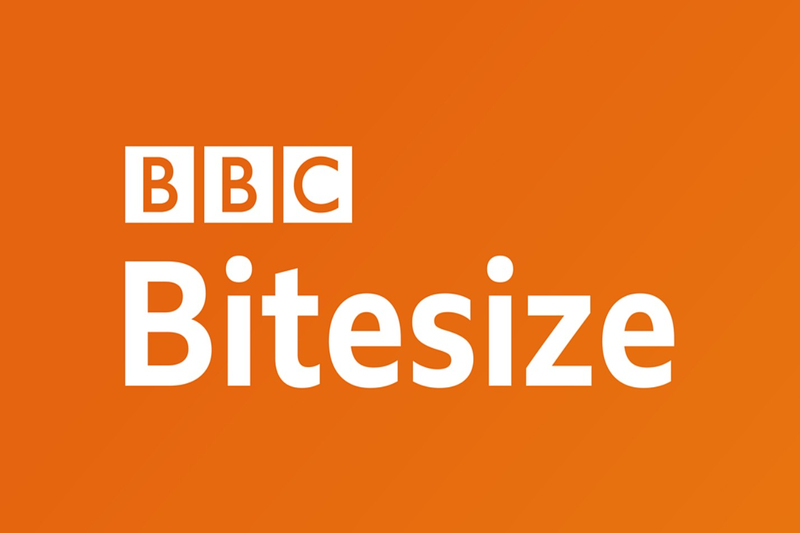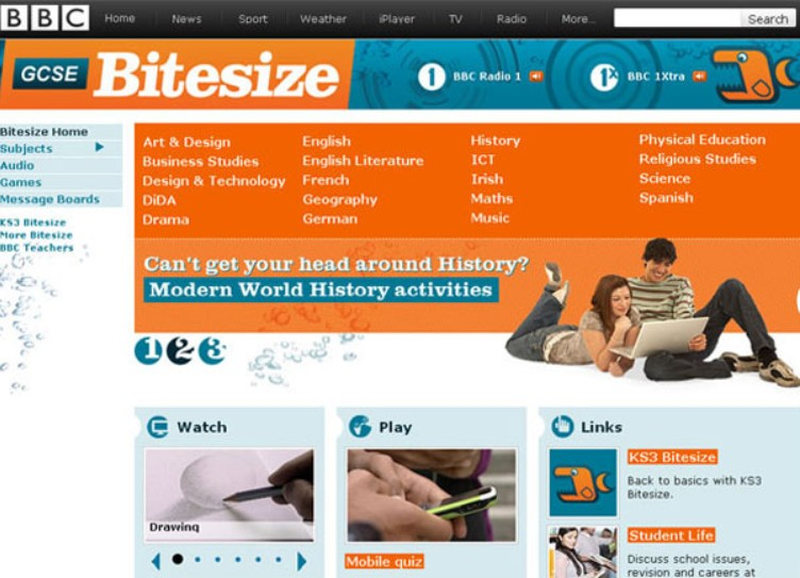
About 100 years ago, when I was still 15, I took my mock GCSEs. It did not go well. I wasn’t a dunce or anything, but I hadn’t been trying very hard. I had just discovered boys, MSN Messenger, and Top of the Pops, so my school work was suffering.
My parents, bless them, were beside themselves but had no idea what to do to help. Luckily for them, something called GCSE Bitesize had just been launched by the BBC, so they sat me in front of it right away.
I hated it. Maybe because it was a bit rubbish, maybe because I was 15 and didn’t want to do extra homework. Who knows? I just remember coming away with a very negative opinion of the whole thing.
Fast forward to now, and the primary school my kids go to are recommending BBC Bitesize as a top up learning tool. My first thought on hearing this was, “That thing still exists!?”
I want to be a responsible parent so of course I checked it out with my children, and do you know what? My kids really enjoyed using it. It’s completely different from how I remember. It starts at Reception level and goes right through the school years. The young kids have games to play, and for the older kids there are small chunks of info backed up by age appropriate imagery – much less boring than I remember it being. It’s bright and colourful, it uses accessible language, it comes in small workable chunks.
Anyway, I thought there may be other parents like me out there who need re-educating on BBC Bitesize, so here goes.
What is it and How Does it Work?

If this is completely new on you, let me explain.
BBC Bitesize in the BBC’s free online learning resource designed for kids of all ages. Parents can access it with their children and do a few games or exercises together, or it can be worked on independently if your kids are older (and to be trusted lol).
It covers all stages of the UK curriculum:
- Key Stage 1 (ages 5-7)
- Key Stage 2 (ages 7-11)
- Key Stage 3 (ages 11-14)
- Key Stage 4 (ages 14-16)
The site is split into Primary and Secondary sections, and once selected, you choose your country (England, Northern Ireland, Wales or Scotland, since they all have slightly different curriculums), then the year your child is in.
It’s all done on a single page so it’s super fast, and from there, the site knows what kind of thing to offer you so it is correct for your child’s age and the things they are learning.
It even has careers and resources for parents and teachers.
It’s a very flexible and adaptable learning tool and genuinely useful. In fact, during COVID people were flocking to Bitesize, and it feels very modern and up to date because of that. They obviously gave it some attention after that surge of interest.
Kids Actually Like It

This is the bit I wasn’t expecting. Kids actually like using BBC Bitesize as a top up learning tool. It doesn’t feel like school work. Yes, it’s extra learning to do at home, but it’s engaging and interesting.
Instead of long blocks of writing in battered text books, you get:
- Short, snappy videos that are well made explaining tricky topics well
- Interactive quizzes that have been partially gamified to make them more engaging
- Colourful graphics and images that back up what is being taught, as well as bringing the whole thing to life
- Step by step guides in subjects like maths and science which expertly break down complex ideas
Kids can try and fail in private, there is no scary red pen, no shame in front of the rest of the class if they get something wrong. There is instant feedback too.
It’s also screen time, which, let’s face it, makes everything more appealing.
I like it too because it takes the pressure off me. I’m not just being selfish – it’s genuinely helpful. I don’t need to remember how to multiply fractions or the confusing rules around semi-colons, I just go through the work with my children and help them with any bits they don’t understand. And occasionally, they help me instead 🙈
A Parents Guide for Using BBC Bitesize

You can’t really get BBC Bitesize wrong, but I do think you can get the most out of it with these tips. I’m not professing to be an expert, but if you want my thoughts, here they are:
Don’t Wait for Homework
Don’t wait for tears when homework is hard or one of your kids starts falling behind. Get into the habit of visiting the BBC Bitesize website every week. Let them pick anything that appeals to them until there are specific goals in mind.
Use it Yourself
You know when your child asks you to help with their homework and you genuinely can’t (don’t pretend this has never happened to you)? Bitesize is a lifesaver here. Sit down and go through something yourself first before sitting down with your child. You’ll be a better help and be able to keep up the pretence that you know everything.
Explore Everything
Don’ just stick to the core subjects. BBC Bitesize includes all sorts, like art, history, geography and music, so use them. They can be a great change of pace if your little one is getting frustrated, and make for interesting chats.
Mix it Into Your Routine
Make it a regular occurrence so it doesn’t end up feeling like a punishment. It’s just something you do for 10 minutes every Wednesday evening, or whenever. I find little and often works best, but see what works for you.
Don’t Ignore the Wellbeing Section
It’s not just about passing exams. Bitesize now has sections on managing worries, big feelings, and even coping with big changes like going up to secondary school. For kids who get anxious, this section can be just as valuable as the academic stuff.
I’m Converted

Looking back, Bitesize and me never got on because I saw it as extra homework. Which of course it is, but it was framed as something I had to do because I wasn’t yet good enough.
It was the wrong approach, although I can’t blame my parents for that. It was the 90s. The right approach is to utilise BBC Bitesize before it is needed. It’s not something you have to do if you are falling behind, it’s something you do as part of your regular learning. It’s a top up. Keep it light.
It’s also a chance to spend some time with my kids and to take an active role in their education. I’m not forcing them to sit at the dining room table until some boring worksheet is complete. I’m sitting with them at the computer and watching a video, or discussing a subject, then letting them complete a quick quiz.
BBC Bitesize should be presented as nothing more than some light revision, with the pressure off. You can up the ante in certain areas if and when it is necessary, but that will be a heck of a lot easier to do if your kids already see Bitesize as something to be enjoyed rather than resented.
Plus it’s a heck of a lot cheaper than a private tutor!
